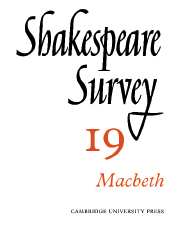Book contents
- Frontmatter
- ‘Macbeth’ in the Twentieth Century
- The Criminal as Tragic Hero: Dramatic Methods
- Antithesis in ‘Macbeth’
- Why was Duncan’s Blood Golden?
- Image and Symbol in ‘Macbeth’
- ‘Macbeth’ and The Furies
- Hell-Castle and its Door-Keeper
- ‘His Fiend-Like Queen’
- The Fiend-Like Queen: A Note on ‘Macbeth’ and Seneca’s ‘Medea
- Shakespeare at Street Level
- New Findings with Regard to the 1624 Protection List
- Shakespeare Productions in the United Kingdom: 1965
- The Royal Shakespeare Company 1965
- The Year's Contributions to Shakespearian Study: 1 Critical Studies
- 2 Shakespeare’s Life, Times and Stage
- 3 Textual Studies
- Index
- Plate Section
‘His Fiend-Like Queen’
Published online by Cambridge University Press: 28 March 2007
- Frontmatter
- ‘Macbeth’ in the Twentieth Century
- The Criminal as Tragic Hero: Dramatic Methods
- Antithesis in ‘Macbeth’
- Why was Duncan’s Blood Golden?
- Image and Symbol in ‘Macbeth’
- ‘Macbeth’ and The Furies
- Hell-Castle and its Door-Keeper
- ‘His Fiend-Like Queen’
- The Fiend-Like Queen: A Note on ‘Macbeth’ and Seneca’s ‘Medea
- Shakespeare at Street Level
- New Findings with Regard to the 1624 Protection List
- Shakespeare Productions in the United Kingdom: 1965
- The Royal Shakespeare Company 1965
- The Year's Contributions to Shakespearian Study: 1 Critical Studies
- 2 Shakespeare’s Life, Times and Stage
- 3 Textual Studies
- Index
- Plate Section
Summary
It is surely unnecessary to argue today that Lady Macbeth’s invocation of the ‘spirits that tend on mortal thoughts’, of the ‘murth’ring ministers’, is a formal stage in demonic possession—though the implications of that statement are rarely if ever pursued. W. C. Curry sufficiently stated the spiritual significance of the invocation in saying that ‘Lady Macbeth deliberately wills that [unclean spirits, wicked angels] subtly invade her body and so control it that the natural inclination of the spirit towards goodness and compassion may be completely extirpated’. But even this statement we may regard as slightly evasive and carrying some of the tones of Coleridge’s examination of her character:
Hers is the mock fortitude of a mind deluded by ambition; she shames her husband with a superhuman audacity of fancy which she cannot support . . . Her speech: ‘Her speech: ‘Come, all you spirits that tend on mortal thoughts,’ etc., is that of one who had habitually familiarised her imagination to dreadful conceptions, and was trying to do so still more. Her invocations and requisitions are all the false efforts of a mind accustomed only hitherto to the shadows of imagination . . .
- Type
- Chapter
- Information
- Shakespeare Survey , pp. 75 - 81Publisher: Cambridge University PressPrint publication year: 1967
- 2
- Cited by

